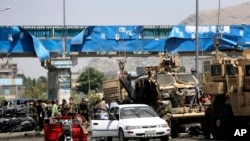Taliban insurgents in Afghanistan have claimed responsibility for Sunday's deadly car bombing in Kabul that targeted a convoy of US-led foreign troops. The attack killed four Afghan civilians and wounded more than two dozens. The violence comes as Afghan officials are confident new measures will speed up an ongoing audit of the controversial runoff presidential vote.
Police say a NATO convoy was moving through western Kabul when a suicide bomber struck it with his explosive-filled vehicle.
An interior ministry spokesman said those killed or wounded by the blast included women and children. Eyewitness Sheren Agha Hamdard spoke to Reuters.
He says it was a "dangerous powerful explosion" and he saw up to six people on the ground, with three of them already dead. He says the victims were "poor civilians" and more than 20 were wounded.
Afghan television footage showed slight damage to a NATO military vehicle. The international coalition said the blast wounded none of its troops.
Taliban insurgents have stepped up attacks in Afghanistan as international forces prepare to wind down their combat mission by the end of this year. The United Nations says the Afghan conflict has seen a 24 percent rise in civilian casualties in the first half of this year.
Sunday's suicide bombing comes days after an American general was killed and more than one dozen people were wounded when an Afghan soldier turned his gun on their delegation visiting Kabul's National Military Academy.
Meanwhile, Afghan election authorities hope the audit of the disputed June 14 presidential runoff vote will make progress Monday when they introduce new software that will automatically invalidate votes based on a mutually agreed criteria.
The internationally-supervised full-ballot audit began on July 17, but so far a little over 5,000 of the nearly 23,000 ballot boxes have been scrutinized. Observers are skeptical about meeting the end of August deadline.
Critics blame teams of rival presidential candidates, Ashraf Ghani and Abdullah Abdullah, for the "painfully slow" process.
Kabul-based Afghanistan Analysts Network, which is observing the process closely, blames the slow pace on wrangling over a small numbers of contested votes, threats and even fist fights between candidate supporters.
Senior researcher at the Network, Kate Clark, tells VOA Afghanistan needs critical reforms in its electoral institutions to ensure future stability and to resolve political disputes locally rather than waiting for foreign interventions.
"It has gone on for the last several elections because there has been this lovely big international presence and valet ready to sort out problems," said Clark. "But it cannot go on again. Next time ISAF (International Security Assistance Force) would not be available to carry ballot boxes. I doubt the US or the UN will be as heavily involved as they are this time. There needs to be a longer term solution."
Observers say U.S. Secretary of State John Kerry's visit to Kabul last week has helped ease the political tensions. It was Kerry's second trip in a month to seek commitments from both Ghani and Abdullah to prevent the electoral process from collapsing and work together to form a "government of national unity."
NATO leaders are readying to gather in Britain in the first week of September to discuss plans for Afghanistan and observers see it a good opportunity for the new Afghan president to present his security and economic vision to ensure continued international financial assistance for his war-ravaged nation.




